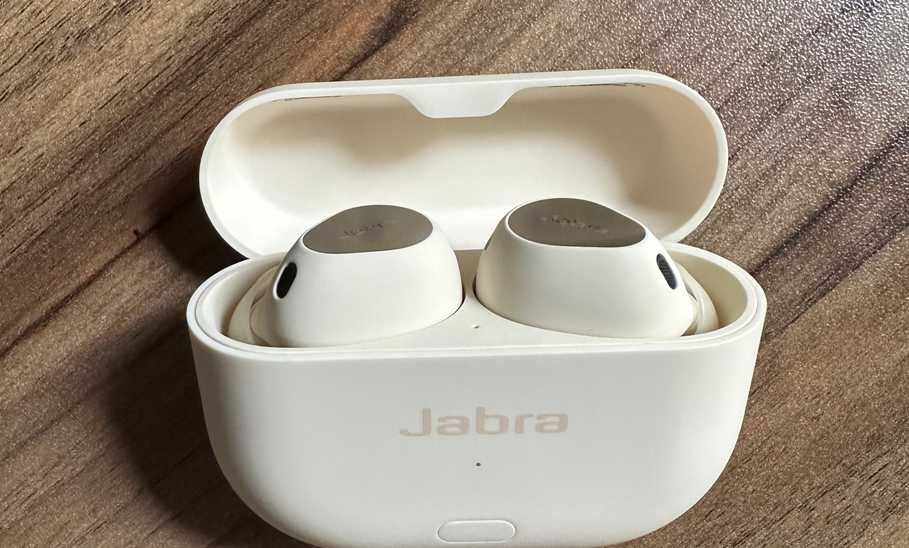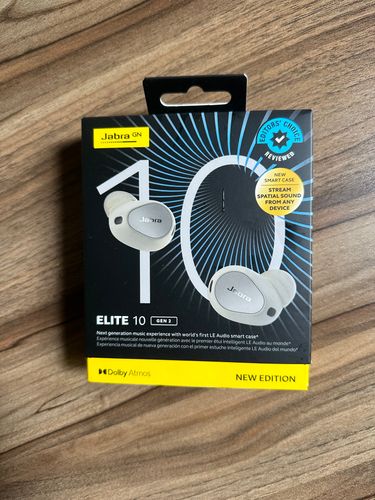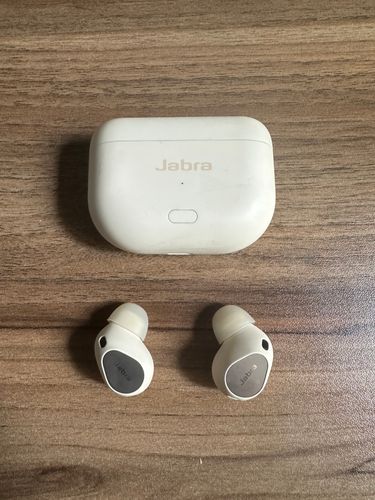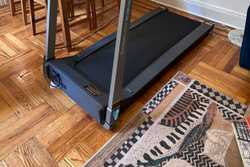Wireless headphones are ubiquitous nowadays, with many different brands getting in on the action from Apple to Bose. In-ear models are particularly popular, thanks to their compact size, portability and sleek look which makes them a great fit for commutes and travel. While I’ve always loved the convenience of earbuds, this design can inhibit sound quality. Even if you’re not a big music snob, the listening experience can be made dramatically better or worse depending on the headphones you use. The challenge is to identify the top performers in the market; a higher price point isn’t always a guarantee that the fit and function will be superior.
The best earbuds will deliver a high-caliber audio experience in a conveniently small package — and that’s what you’ll get with the Jabra Elite 10 Gen 2, albeit at a steep price. Jabra has produced several headphone products over the years under its Elite range, often launching both standard and Active versions. The Elite 10 Gen 2 is the company’s latest and most advanced model and features comprehensive ANC (active noise cancellation), spatial audio with head tracking, and the world’s first LE Audio smart case. It also has a unique shape and design meant to achieve a more comfortable, secure fit for long-term wear.
Since launching the Gen 2, GN (Jabra’s parent company) announced it’s shutting down its headphone business and so this will be the last model Jabra releases. I had high expectations considering the price point and unfortunately, the Elite 10 Gen 2 didn’t quite meet them. Still, there were several features I was impressed by that might convince you to invest.
![[object Object] [object Object]](https://assets2.jabra.com/c/9/e/b/c9ebe2a6399311f16d96e97f47e2a2ce081a0666_Jabra_Elite_10_G2_Titanium_Black_03.png?w=500&h=500&auto=format)
Jabra Elite 10 Gen 2
Unboxing and first impressions
The small size of earbuds means the packaging is usually pretty compact too and the Jabra Elite 10 Gen 2 box was no exception. I liked that the front of the box displayed a clear image of the earbuds themselves — especially since they have a somewhat unconventional shape. This box included Gen 2 labeling, although this was quite small and I’ve heard reports of people accidentally buying the Gen 1 — labeled as Elite 10 — due to unclear signage. Jabra has included callouts to the new spatial audio smart case, as well as the updated Dolby Atmos technology, which increased my enthusiasm for trying out these headphones.
Inside, the box housed the LE Audio smart case with charged earbuds inside, extra ear nozzles in varying sizes, and a charging cable with an included adapter. The earbuds I received were in the soft white colorway, but other options include denim, cocoa, titanium black, and gloss black. The case was a little larger than those of other earbuds I’ve owned, but small enough to slide into a pocket, with a sleek rounded shape and subtle Jabra label on the front. The included cable also unlocks the LE Audio case’s added functionality: It can be used to plug the case directly into a charging port and to connect it with other media players, from amplifiers to old computers and even airplane television displays.
Finally, I took a look at the headphones themselves. Almost teardrop in shape, they have a semi-open design that allows you to nestle the earbud securely into the ear without plugging the entire ear canal. This is meant to alleviate any soreness from prolonged wear. The EarGel nozzle is angled in a way that creates both superior comfort and a snug fit, despite feeling almost loose when in place. The earbud has a smooth, soft rubber finish and the metallic button on the front has the brand name etched elegantly in the center. This button’s haptic feedback was pleasant and subtle, offering a nice alternative to app-based controls.
All in all, I was impressed with the sleek and original design and looked forward to putting it to the test.
Pros and cons
Pros:
- Extremely comfortable in-ear fit, thanks to unique shape and thoughtful textiles
- Powerful ANC that can be adjusted to preferred transparency levels
- Sensitive spatial audio that’s particularly effective when watching video
- Customizable audio playback with several preset filters to choose from
- Attractive design that looks expensive and modern, with several colors available
- Can be connected to two devices at once
- The LE Audio smart case supports wireless charging and can be used to play audio from in-flight entertainment systems
- Weatherproof in terms of water resistance and the ability to buffer wind while taking calls
Cons:
- Occasional initial connectivity problems
- Requires the accompanying app for full customization and functionality
- The sound quality for music playback isn’t quite as good as competitors
- High price point
Price
The Jabra Elite 10 Gen 2 sells for $279.99, making it one of the more expensive wireless earbuds on the market. For comparison, Apple AirPods Pro 2 retail for $249 and Bose QuietComfort Ultra’s retail for $299. (I’ll share more on these alternatives later.)
Jabra sells the Elite 10 Gen 2 directly through its website and Amazon.
![[object Object] [object Object]](https://assets2.jabra.com/c/9/e/b/c9ebe2a6399311f16d96e97f47e2a2ce081a0666_Jabra_Elite_10_G2_Titanium_Black_03.png?w=500&h=500&auto=format)
Jabra Elite 10 Gen 2
Specifications
- Drivers: 10 mm
- Active noise cancellation: Yes
- Battery life: 6 hours with ANC (buds), 36 hours (case)
- Weight: 5.5g (buds) 46.6g (case)
- Connectivity: Bluetooth 5.3
- Bluetooth operating range: 33 feet
- Speaker bandwidth: 20 Hz to 20,000 Hz (music mode), 100 Hz to 8,000 Hz (speak mode)
- Number of microphones: 6
- Waterproofing: Yes, IP57
- Voice assistant enabled: Yes
Key features
Active noise cancellation
The Jabra Elite 10 Gen 2 offers the most advanced ANC of any previous set of noise canceling headphones in the range. Active noise cancellation filters out background sound so you can better hear your own audio, without needing to crank up the volume to compensate for your surroundings. Good ANC can cancel out the majority of background noise so you still hear crisp audio when in a crowded or loud environment such as a train or plane. The Elite 10 Gen 2 utilizes Jabra Advanced ANC and supports not just full ANC but also a customizable HearThrough mode, which allows you to select just how transparent the audio playback is. This can be useful when you still want to be able to hear select external sounds, such as voice announcements, or want to improve your safety by having improved environmental awareness.
Spatial audio with head tracking
Typically, earbuds have used a stereo mode to play audio evenly through both ear pieces, so it sounds full and balanced. The Elite 10 Gen 2 supports this kind of playback but also offers spatial audio with head tracking, supported by Dolby Atmos technology. This lets you hear audio in a more three-dimensional way that puts you in the center.
Advanced head tracking allows the earbuds to adjust sound and playback levels so you always feel like the audio is coming from in front of you, even if your head is turned to either side. In this way, it mimics the effect of watching live music. This can be particularly effective when watching a film or video content with your headphones, as it creates a more immersive experience without the need for surround sound or external speakers. Of course, you may not always want this kind of audio experience, so spatial audio technology can be turned on and off as needed.
Supporting app
Jabra has the best physical buttons of any earbuds in the market, but there’s a limit to how many commands these two buttons can generate. For the most advanced and customizable Elite 10 Gen 2 experience, you’ll want to download the Sound+ app.
The app pairs intuitively with your earbuds and can then be used to control virtually all elements of the listening experience. You can select from the various sound modes available, as well as customize the level of HearThrough you hear, control the Dolby Atmos spatial sound functionality, adjust the EQ levels or choose from six music presets, and play any of several soundscapes. You can also use the Find My Jabra feature to locate your Elite 10 Gen 2, or contact Jabra support for assistance.
LE Audio smart case
One of the biggest selling points of the Elite 10 Gen 2 is the included LE Audio smart case, which Jabra describes as the first of its kind. The cable in the box lets you play sound from any device with a 3.5mm headphone jack or USB-C port, by streaming it through to the case and then to the wireless earbuds. This adds wireless functionality to various media players, from amplifiers to tablets to in-flight entertainment systems.
In many cases, using the included cable is just a simpler process than trying to connect through Bluetooth; in some cases, there may not be Bluetooth functionality and so a physical cable may be your only option. This technology likely won’t regularly be in use, but it’s a great extra feature for travel or when you can’t be bothered to set up Bluetooth on a new, unfamiliar device.
Jabra Elite 10 Gen 2 — Are these earbuds a good fit for you?
I’ve owned many pairs of wireless earbuds, all of varying quality, and the Jabra Elite 10 Gen 2 is up there with some of the best I’ve tried. I mostly use my earbuds for travel, walks in the park and occasional co-working setups, so the ANC functionality was particularly of interest to me — and it delivers. Podcasts are easy to hear even on a busy train, yet I can easily trigger HearThrough mode as soon as I hear the conductor begin to make an announcement. Walking at night feels safe, and I can tune out loud park-goers whenever I need to. The fit took some getting used to, as they sit more loosely in the ear than other models I’ve tried. However, I quickly grew to love this design as it ensured that I never got sore ears or that strange sensation of having your ears sealed up.
While the audio playback may not be quite as advanced as some other headphones in the market, I found it more than sufficient for my listening purposes and it held up when I needed to take calls or listen to voice messages. I didn’t find many opportunities to use the LE Audio smart case as a playback tool, but I’m excited to bring it on my next flight. And I particularly loved the physical playback buttons on the earbuds. They offer the perfect haptic feedback without needing to jam the headphone deep into the ear canal.
The only negative for me is the price; I’m not sure I would spend $280 on these. For that amount, you can buy other headphones with comparable ANC and a superlative audio experience that the Elite 10 Gen 2 just doesn’t quite deliver, even with all its other fun features. So I will happily wear these while I have them, but I don’t think I’ll repurchase them unless they’re on significant sale.
Sound quality
The Elite 10 Gen 2 has a smooth audio experience that will more than satisfy the average person. The six available presets in the Sound+ app are a fun way to experiment with different playback experiences, allowing you to choose from options that support bass-heavy tracks, speech-centric audio, or a completely neutral EQ. You can then further customize the listening experience by creating and saving your own presets. In practice, while I found it fun to play around with these and see the differences on a single track, I fell back into using one or two options for the majority of my listening experience.
And the neutral EQ audio playback experience is — fine. Music didn’t sound noticeably worse or tinny, but it also didn’t take on the transcendent quality that a great music system can confer. Of course, in-ear headphones tend to be less powerful in this sense than over-ear headphones or advanced speaker systems. Yet some other products in the market at a similar price point simply offer richer audio quality. Again, the average person will likely be content with this audio experience, but music aficionados might find these lacking.
Battery life
These headphones have two battery ranges: with ANC activated and without. There’s also a separate battery life for the earbuds themselves and then one for the charging case. With ANC activated, the earbuds have six hours of playback time — about the same as the Apple AirPods Pro 2. This is on the lower end of the scale in the market, but wasn’t a problem in my experience.
The charging case, however, supports up to 36 hours of playback time without ANC and 27 hours with ANC, which is on the longer end of the battery-life spectrum. Since you can listen to a single headphone on mono mode while the other one charges, I never found myself inconvenienced by the overall battery power and found that I rarely had to charge the case in between uses. For weekends away or long commutes, the Elite 10 Gen 2 more than delivers, thanks to the extended battery life of the case.
ANC
Active noise cancellation is a popular feature in today’s busy world and I was impressed by the quality of Jabra’s ANC technology. When I was out for a walk, a simple press of the left earbud button activated the ANC mode and the difference was immediate: It seemed like all background sound was filtered out, even on busy New York City streets. While there was some audio that came through from the subway, again the difference was extreme and made my listening experience easier and more pleasant. There may be more effective ANC functionality out there, but I don’t think I’d want any more sound filtered out — that would verge on eerie.
I also valued the HearThrough mode and adjustable transparency settings, which let me opt into some background noise when it felt safer or necessary to have greater awareness of my surroundings. Controlling this was easy and intuitive within the app, although I more frequently just clicked that left earbud to immediately flip modes with no need to pull out my phone. This was particularly useful whenever I needed to pop into a store or briefly communicate with someone, as it didn’t require me to remove my earbuds altogether.
Bluetooth connectivity
Bluetooth pairing was easy to set up with the Jabra Elite 10 Gen 2. I quickly paired the headphones to my iPhone and later to my MacBook; both processes that took a matter of seconds. I also appreciated that it was possible to stay connected to both devices at once, so I could easily toggle between audio on either one as needed. The only issue was when I removed the earbuds from their case, occasionally, only one earbud would automatically connect and begin to stream. This was easily resolved by simply pressing the button on the quiet earbud; it never took more than this to correct the issue. However, it was a slightly annoying occurrence that happened several times when I first began using the devices. It then seemed to resolve on its own.
I accidentally put the Bluetooth range to the test when I went to take the garbage out and forgot I was still wearing the Elite 10 Gen 2. My music continued to play through the full lobby of my building and only cut out when I left through the front door, which suggests a significant Bluetooth range. As soon as I came back within range, the earbuds automatically reconnected and began to play the music where it had left off — something that has not happened with other headphones I’ve tried. While I don’t plan to be consistently far away from my streaming device, it was reassuring to know I had more range of movement than I thought (33 feet.)
Microphone
Like many millennials, I’m not one for phone calls but I’m a big fan of voice notes, so I put the microphone capabilities of these headphones to the test. In general, the microphone captured a slightly more tinny version of my voice than the microphone on my iPhone, however the audio was still crisp and clear.
I was impressed by the microphone’s ability to clean up any background noise so my voice was the prominent feature. In fact, I tested the microphone by recording messages with and without music playing in the room and it was almost impossible to detect which was which. This was similarly true when I left my (admittedly quite sound-proofed) apartment and recorded messages from outside, although some ambient noise did creep into the recordings in those instances.
Voice calling performance
Since the Bluetooth range of these headphones was so impressive, I expected the Elite 10 Gen 2 to offer good connectivity for calls — and it did. On the few reluctant occasions I made or accepted a phone call, I was pleased with the reception and quality of the connection. Like the voice memos I recorded in my phone, making phone calls from a relatively quiet indoor environment was a pleasant experience. The ANC was effective at clearing up minor external sounds and elevating my voice volume, so that I was easy to hear. This was less true when in a busy outdoor setting, with less powerful noise cancellation.
While Jabra offers a Wind Noise Reduction feature, it warns that this can render ANC more ineffective and I found this to be true in practice. Of course, it was still better to take calls with the headphones in than without any at all, but I know that there are other wireless headphones on the market that can offer a clearer and richer phone call experience, even in loud environments.
Comfort
Here’s where I found the Jabra Elite 10 Gen 2 to really shine. Simply taking the headphones out of the case, I immediately noticed the pleasant feel of the earbud material and the malleability of the EarGel tips. The earbud almost felt like suede since there was a softness to it, rather than the hard plastic of so many other brands.
When I put the headphones in for the first time, I wasn’t sure I’d found the right fit; it often felt like they were only loosely in place and would fall out if I so much as turned around too fast. Yet I quickly learned this is simply the Jabra style — and one that has many benefits. The semi-open design means you don’t need to force the earbud deep into place. If it ever does slip out of the ideal position, a gentle nudge is enough to push it back into a secure fit. Even when I danced around my living room or ran up the subway stairs to catch a train, the earbuds never budged (unlike previous brands I’ve tried.)
They also simply felt good. I’ve fallen asleep wearing these headphones — they are that comfortable — and have never taken them out after extended wear and felt any irritation or soreness. If you wear your earbuds for long periods, this could be enough to make it worth buying the Elite 10 Gen 2.
Design and build quality
As mentioned, the Jabra Elite 10 Gen 2 earbuds have a unique semi-open design that focuses on comfort and fit. Rather than plugging the ear canal and sealing it off from external noise, these headphones nestle into the ear and only partially block the canal. This is gentler on the skin and makes it easier to wear the earbuds for an extended amount of time, although there may be some loss of ANC and audio quality. I found the earbuds often felt loose in my ear but were more securely in place than I thought — they never fell out during my testing and I only pushed them back into place out of habit rather than actual need.
The textiles used are soft and high quality, making them pleasant to have against the skin for hours on end. At only 5.5 grams each, they felt light and looked discreet when in-ear, which I appreciated. I also enjoyed the tactile sensation of the physical buttons on each earbud. The metallic finish looks cool and the button requires only a gentle press to click, which is good for your ear’s comfort but satisfying from a haptic feedback perspective. These buttons are the best of any headphones I’ve worn and make it easy to control your audio experience without pulling out your smartphone to access the app.
The charging case is a classic clamshell design and slightly larger than some other headphones I’ve tried, yet still able to fit inside a pant pocket. The available colors are rich and elegant, although the soft white colorway is prone to stains and general marks on the case. I found them easy to remove, but it was a pain to do this every couple of days or so. Still, the case feels nice in the palm and is substantial and well-made.
What should you get instead of Jabra Elite 10 Gen 2?
As noted above, these are great headphones but there are a few drawbacks. The price means these aren’t a budget-friendly option and you can find other products with similar audio quality for less money. If you’re willing to invest, you can also find other wireless headphones with a more expansive audio experience. Of course, the LE Audio smart case is unique to Jabra and the earbud design is particularly pleasant to wear, which you won’t necessarily get with alternative products. However, the following are the other wireless headphones you might want to consider.
Apple AirPods Pro 2
Apple lovers can round out their suite of products with the brand’s signature wireless earbuds: the AirPods Pro 2. At $249, they’re a little more affordable than both the Jabra Elite 10 Gen 2 and these other alternatives — a rarity with an Apple product.
These headphones offer excellent call quality and audio playback and the in-ear design is both comfortable and stylish, which we’ve all come to expect from this brand. They don’t come in fun colors, nor do they include any fun accessories, but the noise cancellation is powerful and these headphones deliver on the key features you’ll use daily.
Bose QuietComfort Ultra
For lovers of noise cancellation, you can’t do much better than the Bose QuietComfort Ultra. In fact, wearing these is almost disorienting because the silencing of external sound is so effective. At $299, these are a little more expensive than the Jabra Elite 10 Gen 2, but they deliver a slightly superior performance in most categories related to audio experience.
I personally prefer the fit and feel of the Jabra earbuds, but music lovers will appreciate the QC Ultra’s incredible spatial audio and depth of both bass and treble. This is the pick for you if you want maximum power and performance in a sleek, if pricey, package.
Technics EAH-AZ80
These headphones may not be on your radar, but they should be. The Technics Premium Hi-Fi True Wireless Earbuds retail for $299.99, which is a little more than the Jabra Elite 10 Gen 2 — but you do get a little more for that extra $20. The Premium Hi-Fi offers a slightly better experience in several areas, from richer audio to three-device connectivity, and impressive wind noise reduction. Phone calls are crisp and clear and music comes through balanced and precise, although without the dynamism of the Bose earbuds. Its battery life is an hour longer than the Elite 10 Gen 2 and the fit is comfortable for long-term wear.
The only real downsides are the less effective noise cancellation, the slightly flat musical playback, and the price. Whether this is the pick for you all depends on your priorities when it comes to listening.
Read the full review: Technics EAH-AZ80 Review: A Premium Experience at a Mid-Level Price Point
Final verdict
I like the Jabra Elite 10 Gen 2. They’re supremely comfortable, the noise cancellation is as powerful as I need it to be, the controls are intuitive and pleasant to use, and the quality of music more than suffices. I think the design is attractive and practical and the available colors are original yet subtly tasteful. I have found the accompanying Sound+ app to supplement the listening experience in a valuable way, without requiring me to spend ages tinkering with various EQ settings. While I haven’t found much need to use the accompanying LE Audio smart case, I like knowing that the option is available to me — and I have used the two-device connectivity on several occasions, with ease.
And yet. Are these the best headphones at this price point? No, I don’t think so. For $279, these aren’t quite as good as the price suggests and you can find comparable yet slightly superior products on the market. If you’re focused on comfort, the LE Audio smart case functionality, or the efficiency of the physical buttons, these might be the best choice for you. But in general, I’d recommend saving a little money on the AirPods Pro 2 or investing a little more on the Technics Premium Hi-Fi True Wireless Earbuds for an all-around improved experience.
![[object Object] [object Object]](https://assets2.jabra.com/c/9/e/b/c9ebe2a6399311f16d96e97f47e2a2ce081a0666_Jabra_Elite_10_G2_Titanium_Black_03.png?w=500&h=500&auto=format)
Jabra Elite 10 Gen 2


![[object Object] [object Object]](https://assets2.jabra.com/c/9/e/b/c9ebe2a6399311f16d96e97f47e2a2ce081a0666_Jabra_Elite_10_G2_Titanium_Black_03.png?w=500&h=500&auto=format)








